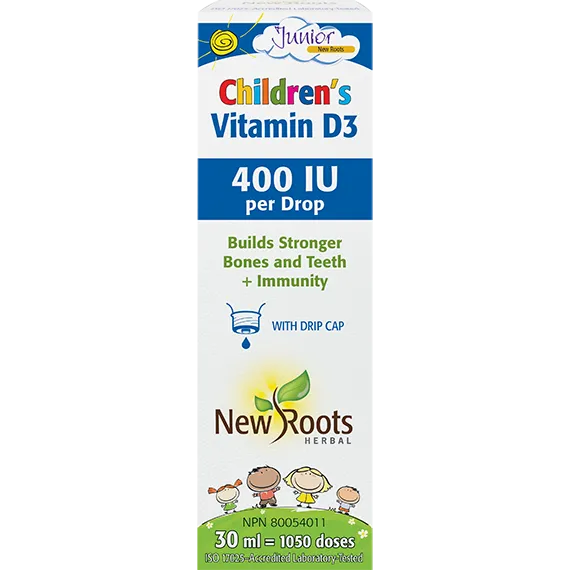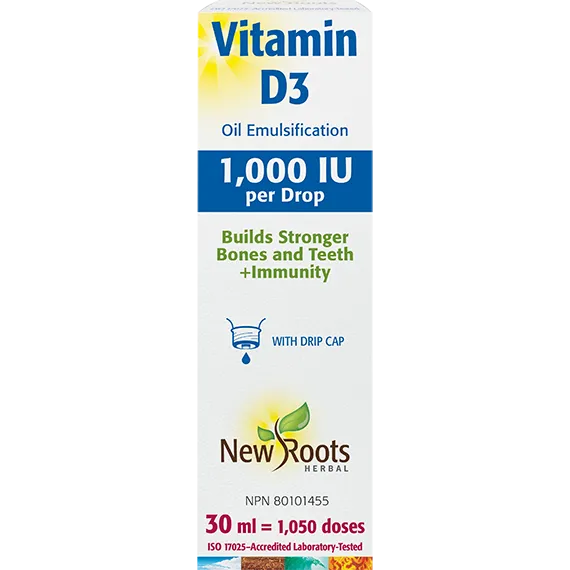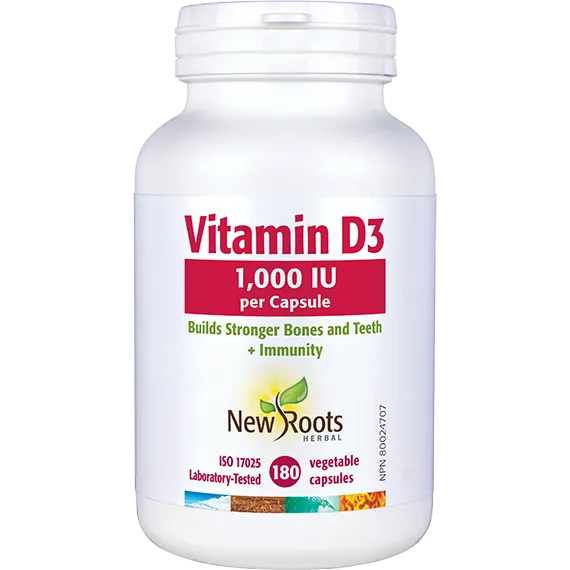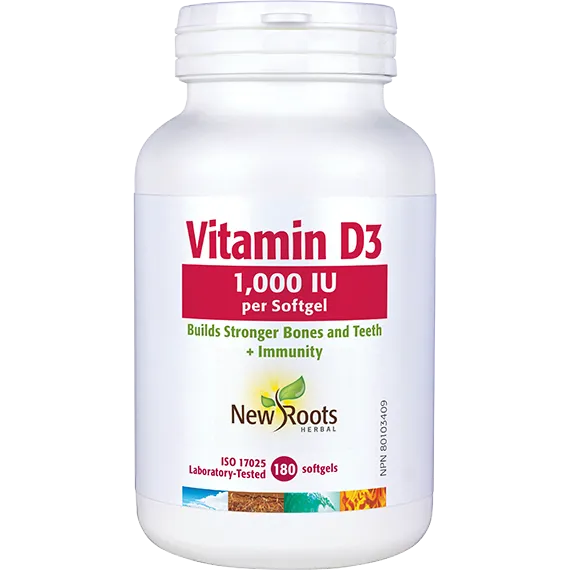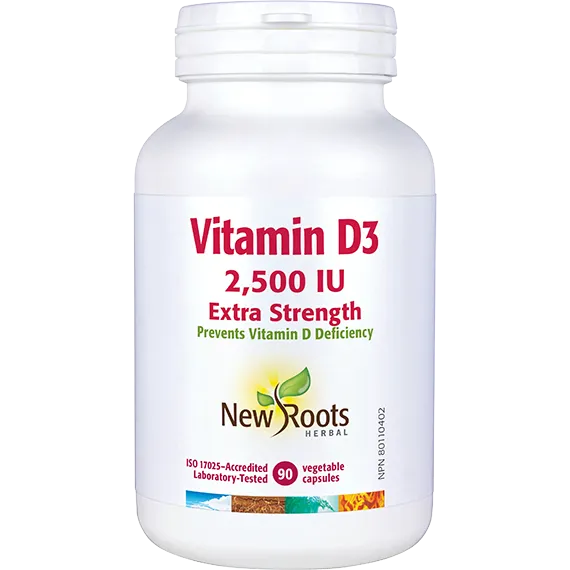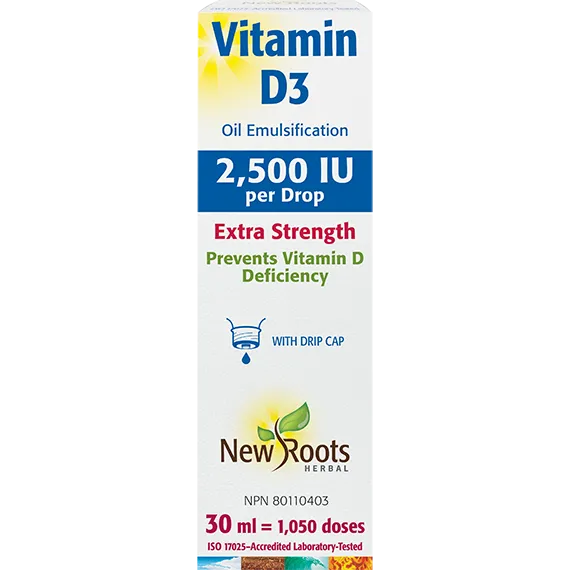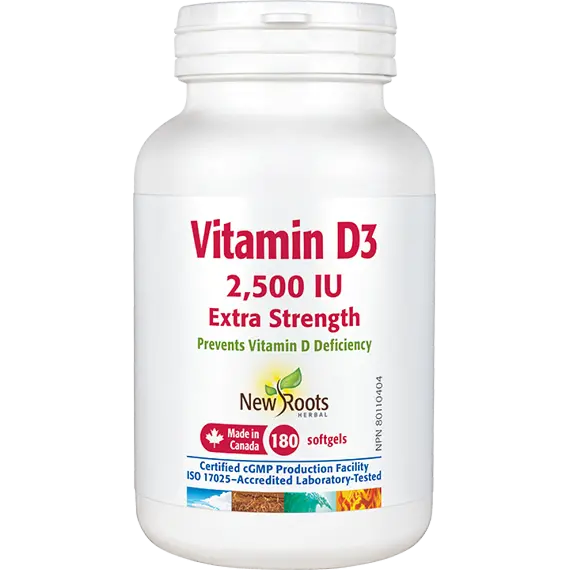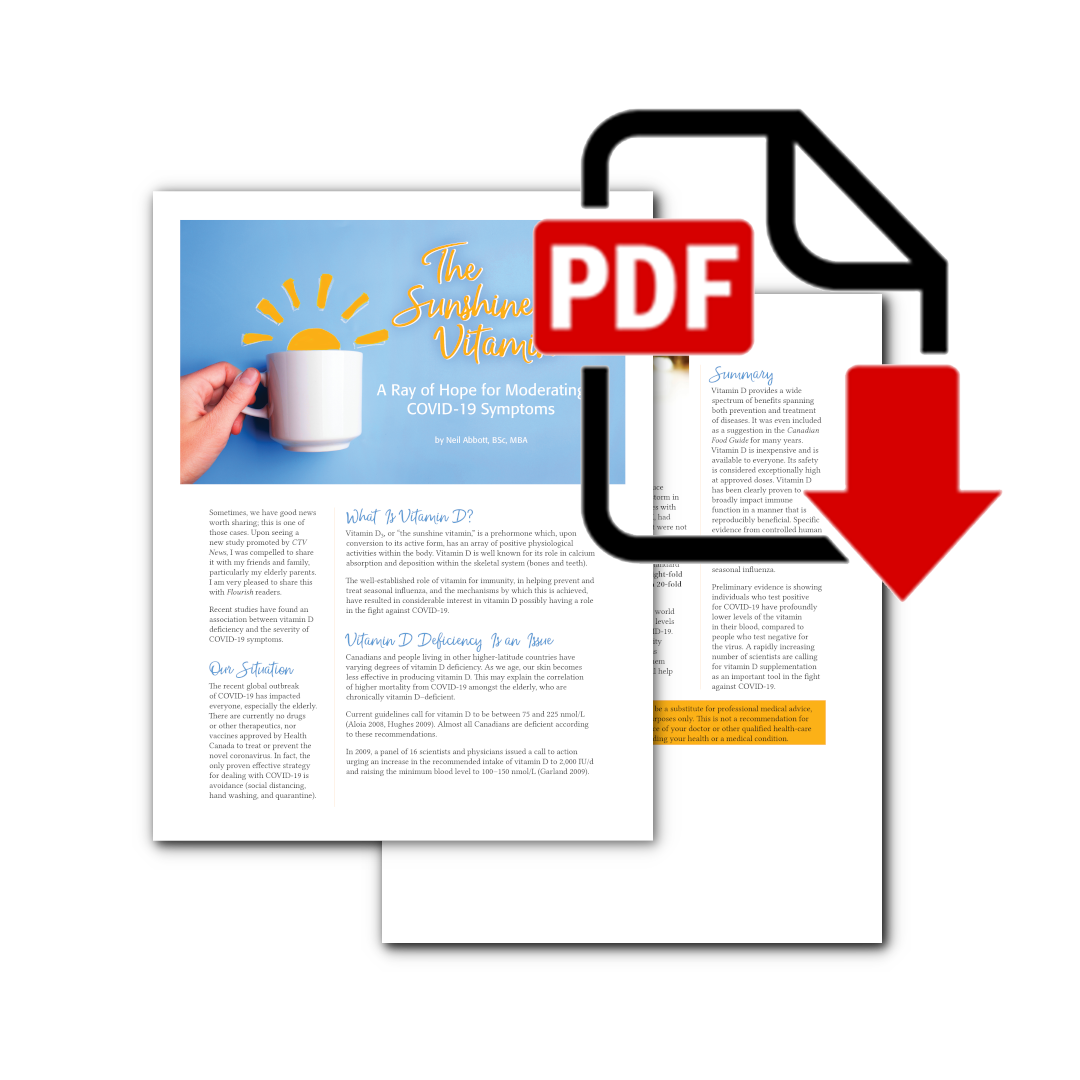Are you Getting Enough Vitamin D?
Millions of Canadians are not!
Vitamin D3 is central to better health in many ways. It helps supports immune function and lock down calcium for bone growth and tooth health.
Approximately 1/3 of Canadians are Vitamin D3 deficient, according to Statistics Canada.1 This number fluctuates seasonally with 40% of Canadians being deficient during winter months, and a surprisingly high 25% during summer.
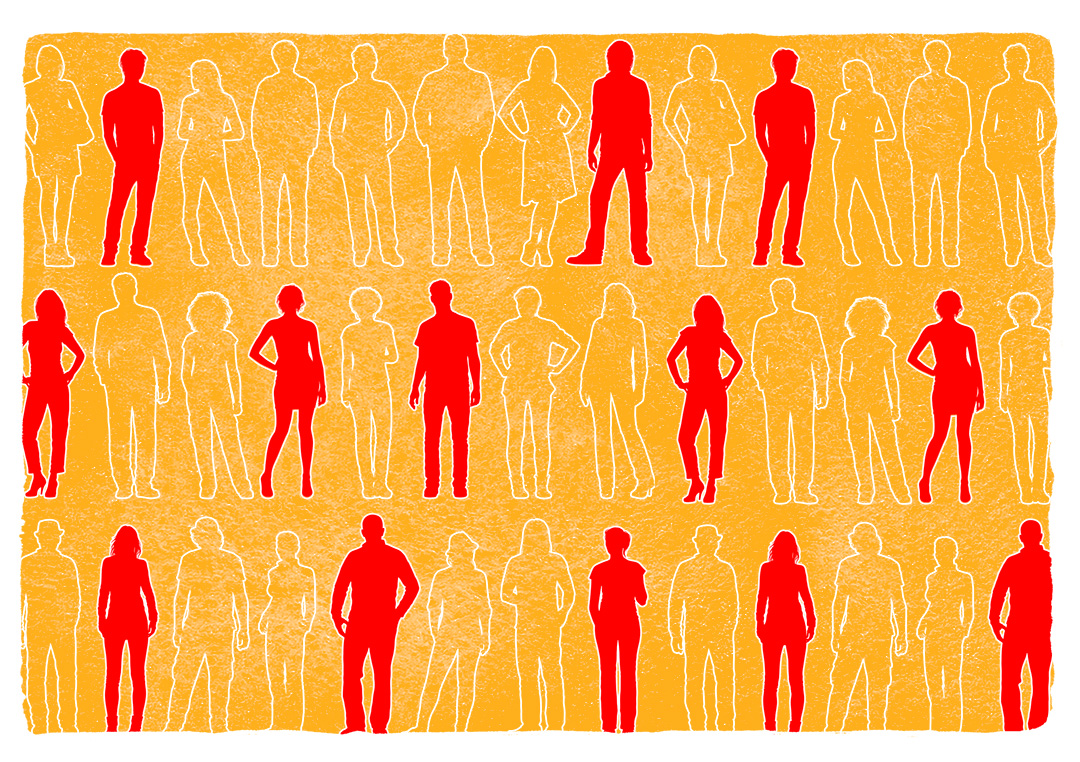
A dose a day can keep the doctor away
Studies show that Vitamin D3 deficiencies may be linked to a wide number of conditions, including but not limited to:
Depression
Arthritis
ADHD
Type 2 Diabetes
Chronic pain
Osteoporosis
Fraction from falls
Auto-immune Disorders
Atopic Skin Disorders
Cancer
Seasonal Affective Disorder
Infections

Why sunshine is not sufficient
Summer’s soothing rays may feel great; however, exposure to adequate amounts sunshine to produce the required amount of daily Vitamin D3 is more difficult than one might think.
Vitamin D3 is produced by our body via sun exposure, with required amounts of ultraviolet radiation, on uncovered skin. However, in most Canadian cities, the sun is only strong enough between May and August. To produce adequate daily levels, you need to spend at least 20 minutes outdoors between 10 a.m. and 2 p.m., with most of your skin exposed, and without sun protection.
Factors that diminish Vitamin D production
- avoiding harmful UV radiation altogether
- using sunscreen
- wearing UV-protective clothing
- sun umbrellas / shade
- working indoors (most windows block UV)
- having darker skin tones (melanin blocks UV absorption)
- pregnancy / peri-natal and breast feeding
- smog
- heavy cloud cover (UV rays can pass through light clouds)
- aging
- living in the northern hemisphere
Is all Vitamin D the same?
Nowadays most of the people know the ‘’sun vitamin“ but few are aware that there are significant differences between the two forms D2 and D3. Both are produced with the support of the sun UV’s yet Vitamin D2 is a plant vitamin that can be found in mushrooms and certain types of plaids, whereas Vitamin D3 is primarily produced in self-synthesis but is also found in fatty fish species and dairy products.
One thing they have in common: the human body must transform either form of Vitamin D for it to become active. Fortified foods and supplements can contain both forms, but studies show that Vitamin D3 has a greater impact on health. This is due to a more efficient metabolism: for instance, vitamin D3 binds better to the transport molecules in the blood, resulting in superior distribution throughout the body.
Vitamin D3, also called Cholecalciferol, should be the favoured form for fortified foods and supplements.
New Roots Herbal Vitamin D3
High-quality vitamin D supplements with the best bioavailability for the body are only those that rely on natural vitamin D3, and are laboratory tested for quality and potency. Unfortunately distributors are not obliged to prove potency and quality, resulting in a wide variety of products available on the market that might have either dangerously higher levels or non-effective lower potency, let aside the purity of ingredients.
All our New Roots Herbal’s products are tested in an ISO 17,025 accredited Laboratory ensuring you get exactly what is on the label with the right instructions for dosage.
New Roots Herbal Vitamin D3 supplements are available in liquid, soft gel and capsules. For immune support, bone development and to help prevent deficiency.
They come in:
What’s standing in your way?
New Roots Herbal Vitamin D is available at quality health food stores.
Find one near you today – Link to Store locator
Still not convinced?
See what Dr. Philip Rouchotas
says about Vitamin D
Most Recent Studies
The evidence is preliminary, but very promising.
It demonstrates correlation, and further investigation is required to show causality.

Effect of calcifediol treatment versus intensive care unit admission and mortality among patients hospitalized for COVID-19
o Castillo M.E. et al demonstrated that calcifediol, significantly reduced the need for ICU treatment of patients requiring hospitalization due to proven COVID 19.
" Our pilot study demonstrated that administration of a high dose of Calcifediol or 25-hydroxyvitamin D, a main metabolite of vitamin D endocrine system, significantly reduced the need for ICU treatment of patients requiring hospitalization due to proven COVID-19. Calcifediol seems to be able to reduce severity of the disease, but larger trials with groups properly matched will be required to show a definitive answer. "
Entrenas Castillo M, Entrenas Costa LM, Vaquero Barrios JM, et al. "Effect of calcifediol treatment and best available therapy versus best available therapy on intensive care unit admission and mortality among patients hospitalized for COVID-19: A pilot randomized clinical study". J Steroid Biochem Mol Biol. (2020)

Vitamin D supplementation may improve clinical outcomes for patients with coronavirus-2019 (COVID-19)
Alipio, M. (2020) shows that in a group of 212 patients with COVID-19 most of them are deficient in vitamin D.
" Vitamin D status is significantly associated with clinical outcomes "
Alipio, Mark, Vitamin D Supplementation Could Possibly Improve Clinical Outcomes of Patients Infected with Coronavirus-2019 (COVID-19) (April 9, 2020).

25-Hydroxyvitamin D concentrations are lower in patients with positive polymerase chain reaction (PCR) test for SARS-CoV-2.
D'volio and colleagues (2020) compared the level of vitamin D in people with COVID-19 and in uninfected people, with average results of 11.1 and 24.6 ng / ml respectively. 25OHD3.
" Based on this preliminary observation, vitamin D supplementation may be a useful measure to reduce the risk of infection "
D’Avolio, A., et al. “25-Hydroxyvitamin D concentrations are lower in patients with positive PCR for SARS-CoV-2.” Nutrients, Vol. 12, No. 5 (2020): E1359.

Preventive supplementation in patients not seriously ill and hospitalized for the new coronavirus 2019 (COVID-19): justification and feasibility of a shared pragmatic protocol.
Caccialanza R. and colleagues propose an early nutritional supplementation protocol including vitamin D for COVID-19 patients not hospitalized for serious disease and who show signs of malnutrition or are at risk of malnutrition.
" If 25-hydroxyvitamin D is deficient, cholecalciferol is quickly supplied "
Caccialanza, R. et al. “Early nutritional supplementation in non-critically ill patients hospitalized for the 2019 novel coronavirus disease (COVID-19): Rationale and feasibility of a shared pragmatic protocol.” Nutrition, Vol. 74 (2020): 110835.

The role of vitamin D in suppressing the cytokine storm in COVID-19 patients and associated mortality.
Daneshkhah, A., and colleagues (2020) reviewed data from different countries to highlight the link between the high levels of C Reactive Protein (CRP) seen in severe COVID-19 inflammatory conditions with excessive production of cytokines, and vitamin D deficiency.
" Based on hindsight and indirect evidence, we see a possible role for vitamin D in reducing complications stemming from unregulated inflammation and cytokine storms "
Daneshkhah, A., et al. “The role of vitamin D in suppressing cytokine storm of COVID-19 patients and associated mortality.” Preprint on medRxiv before peer review. May 18, 2020.

Evidence that vitamin D supplementation may reduce the risk of Influenza and SARS-CoV-2 infection and death.
Grant and colleagues (2020) review scientific and epidemiological evidence supporting the role of vitamin D in reducing the risk of COVID-19.
" To reduce the risk of infection […] the goal should be to increase concentrations of 25 (OH) D above 40 to 60 ng / mL (100 to 150 nmol / L). For the treatment of people infected with COVID-19, higher doses of vitamin D3 may be helpful "
Grant, W.B., et al. “Evidence that vitamin D supplementation could reduce risk of influenza and COVID-19 infections and deaths.” Nutrients, Vol. 12, No. 4 (2020): 988.

Potential role of vitamin D in the elderly to resist COVID-19 and slow the progression of Parkinson\'s disease.
Hribar and colleagues (2020) conducted a literature review to determine the relationship between vitamin D, Parkinson\'s disease and COVID-19
" We concluded that the daily supplementation of 2000–5000 IU/day of vitamin D3 in older adults with PD has the potential to slow the progression of PD while also potentially offering additional protection against COVID-19. "
Hribar, C.A., P.H. Cobbold, and F.C. Church. “Potential role of vitamin D in the elderly to resist COVID-19 and to slow the progression of Parkinson’s disease.” Brain Sciences, Vol. 10, No. 5 (2020): E284.

Vitamin D and respiratory health.
Hugues and colleagues (2009) review the known effects of vitamin D on immune function, particularly on respiratory health.
" Vitamin D appears capable of inhibiting pulmonary inflammatory responses while enhancing innate defence mechanisms against respiratory pathogens. "
Hughes, D.A., and R. Norton. “Vitamin D and respiratory health.” Clinical and Experimental Immunology, Vol. 158, No. 1 (2009): 20–25.

COVID-19 and vitamin D - Is there a link and a possibility of intervention?
In this letter to the editor, Jakovac (2020) recalls the existence of a large body of well-established data on the antiviral, immunomodulatory, and anti-inflammatory effects of vitamin D; which may prove useful against COVID-19, especially to combat symptoms of acute respiratory distress and cytokine storms.
" From the public health aspect, the recommendation of intensive supplementation as possible prophylaxis also could be considered. Given the good tolerability and safety of even high doses of vitamin D, this approach complies primum non nocere principle (first, do no harm). "
Jakovac, H. “COVID-19 and vitamin D—Is there a link and an opportunity for intervention?” American Journal of Physiology. Endocrinology and Metabolism, Vol. 318, No. 5 (2020): E589.

‘Scientific strabismus’ or two related pandemics: COVID-19 & vitamin D deficiency.
Kara and colleagues (2020) put the geography of COVID-19 in perspective in this article, observing that the countries most affected by the disease (countries of mid-northern latitude with an average temperature of 5 to 11 ° C and a low humidity), are also those where populations are most deficient in Vitamin D. For example: 40% of Europeans are deficient in vitamin D (25-hydroxyvitamin D (25OHD) <50 nmol / l) and 13% are deficient (25OHD <30 nmol / l).
" […] we would like to call attention to the possible association between severe vitamin D deficiency and mortality pertaining to COVID-19. Given its rare side effects and relatively wide safety, prophylactic vitamin D supplementation and/or food fortification might reasonably serve as a very convenient adjuvant therapy for these two worldwide public health problems alike. "
Kara, M. et al. “‘Scientific strabismus’ or two related pandemics: COVID-19 & vitamin D deficiency.” The British Journal of Nutrition, 2020 May 12: 1–20

Optimization of vitamin D status for enhanced immuno-protection against COVID-19.
McCartney and Byrne (2020) point out the link between vitamin D deficiency and the increased risks of respiratory infections; as well as certain protective mechanisms of vitamin D such as the suppression of CD26, a cell adhesion molecule used by SARS-Cov-2 for the invasion of host cells; or the attenuation of the inflammatory responses of gamma interferon (IFNγ) and interleukin 6 (IL-6), two strong predictors of poor results in critically ill patients on respiratory assistance, including those affected by Covid -19.
" We recommend that all older adults, hospital inpatients, nursing home residents and other vulnerable groups (e.g. those with diabetes mellitus or compromised immune function, those with darker skin, vegetarians and vegans, those who are overweight or obese, smokers and healthcare workers) be urgently supplemented with 20-50µg/d of vitamin D to enhance their resistance to Covid-19, and that this advice be quickly extended to the general adult population. "
McCartney, D.M., and D.G. Byrne. “Optimization of vitamin D status for enhanced immuno-protection against COVID-19.” Irish Medical Journal, Vol. 113, No. 4 (2020): 58.

The Association Between Vitamin D Deficiency and Community-Acquired Pneumonia: A Meta-Analysis of Observational Studies.
In this meta-analysis totaling more than 21,000 people, Zhou and colleagues (2019) summarize that\r\nthose with a serum vitamin D level <20 ng / ml (i.e. <50 nmol / l) had a 64% increased risk of community-acquired pneumonia. \r\n
" The evidence from this meta-analysis indicates an association between vitamin D deficiency and an increased risk of CAP patients. However, well-designed trails are required to determine the explicit effect of vitamin D supplementation "
Yun-Fang Zhou, et al. The Association Between Vitamin D Deficiency and Community-Acquired Pneumonia: A Meta-Analysis of Observational Studies. Medicine 2019 Sep;98(38):e17252.

Vitamin D Supplementation to Prevent Acute Respiratory Tract Infections
In this systematic review and meta-analysis, Martineau and colleagues (2017) selected 25 randomized controlled trials including 11,321 participants aged 0 to 95 years, who took vitamin D as a supplement.
" Vitamin D supplementation was safe, and it protected against acute respiratory tract infection overall. Patients who were very vitamin D deficient and those not receiving bolus doses experienced the most benefit. "
Martineau A et al. Vitamin D Supplementation to Prevent Acute Respiratory Tract Infections: Systematic Review and Meta-Analysis of Individual Participant Data.

Estimation of Optimal Serum Concentrations of 25-hydroxyvitamin D for Multiple Health Outcomes
Bischoff-Ferrari H. et al. (2006) summarize the evidence from multiple studies assessing the optimal serum concentration thresholds of 25 (OH) D against various health criteria including: bone mineral density, lower limb function, dental health, risk of falls, fractures and colorectal cancer
" For all endpoints, the most advantageous serum concentrations of 25(OH)D begin at 75 nmol/L (30 ng/mL), and the best are between 90 and 100 nmol/L (36-40 ng/mL). "
Bischoff-Ferrari H. et al. Estimation of Optimal Serum Concentrations of 25-hydroxyvitamin D for Multiple Health Outcomes. Review Am J Clin Nutr. 2006 Jul;84(1):18-28.

Vitamin D’s Effect on Immune Function
Martens and colleagues (2020) show the beneficial effects of vitamin D3 on cells of the immune system which for the most part have vitamin D3 receptors. They also warn against inappropriate recommendations for large doses of vitamin D3.
" Avoidance of severe vitamin D deficiency improves immune health and decreases susceptibility to autoimmune diseases. There seems to be no additional health benefit in doses higher than 4000 IU/day. "
Martens PJ. et al. Vitamin D’s Effect on Immune Function. Nutrients. 2020 May; 12(5): 1248.

Association of Vitamin D Deficiency and Treatment with COVID-19 Incidence
Meltzer and colleagues (2020) estimate that patients deficient in vitamin D (25-OH-D3 <20 nmol / L) are 77% more likely to be infected with SARS-cov-2.
" Testing and treatment for vitamin D deficiency to address COVID-19 warrant aggressive pursuit and study. "
Meltzer D. et al. Association of Vitamin D Deficiency and Treatment with COVID-19 Incidence. Preprint Posted May 13th, 2020 on MedRxiv. doi: https://doi.org/10.1101/2020.05.08.20095893.

Low plasma 25(OH) vitamin D3 level is associated with increased risk of COVID-19 infection
Merzon E. and colleagues (2020) estimate that people deficient in vitamin D3 (25-OH-D3 <30ng / ml (<75 nmol / L)) are 58% more likely to be infected with SARS-cov- 2, and 109% more at risk of being hospitalized in case of infection. Psychiatric and somatic disorders, age over 50, low socio-economic status and being male were also associated with a higher risk of COVID-19.
" The mean plasma vitamin D level was significantly lower among those who tested positive than negative for COVID-19. "
Merzon E. et al. Low plasma 25(OH) vitamin D3 level is associated with increased risk of COVID-19 infection: an Israeli population-based study

Vitamin D deficiency and co-morbidities in COVID-19 patients - A fatal relationship?
Biesalski (2020) puts COVID-19 risk factors in perspective while looking at their close links with vitamin D status and the renin-angiotensin system - RAS (one of the most important endocrine and enzymatic regulation systems of autonomic, cardiovascular and pulmonary functions); including hypertension and cardio and cerebro-vascular diseases, diabetes, kidney disease or chronic obstructive pulmonary disease. The author also describes the role of vitamin D and the RAS in symptoms related to COVID-19 such as respiratory distress syndrome, cytokinic storm or Kawasaki syndrome.
" Co-morbidities and old age show a relationship with Renin-Angiotensin-Aldosteron-System (RAS), vitamin D status and COVID-19 infection. "
Biesalski H. Vitamin D deficiency and co-morbidities in COVID-19 patients ñ A fatal relationship? NFS Journal. 2020 Aug; 20: 10ñ21. Published online 2020 Jun 7.
Premium natural supplements, available exclusively at fine natural health–food stores
Always seek the advice of your physician or other qualified health-care practitioner with any questions you may have regarding a medical condition.
Never disregard professional medical advice or delay in seeking it because of something you have read on this website.
To ensure these products are right for you, always read and follow label instructions.

